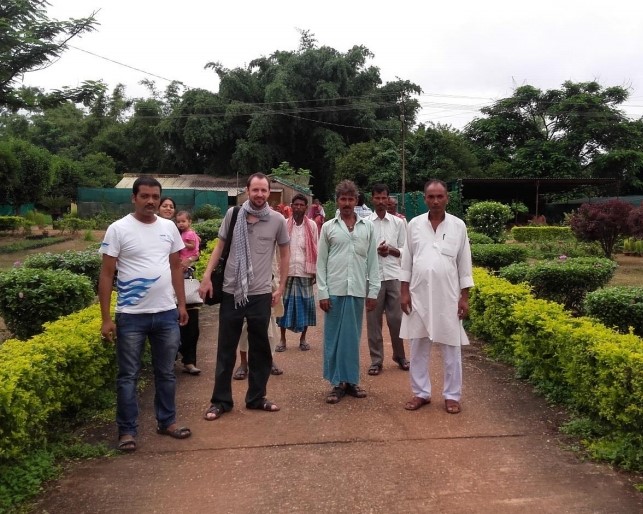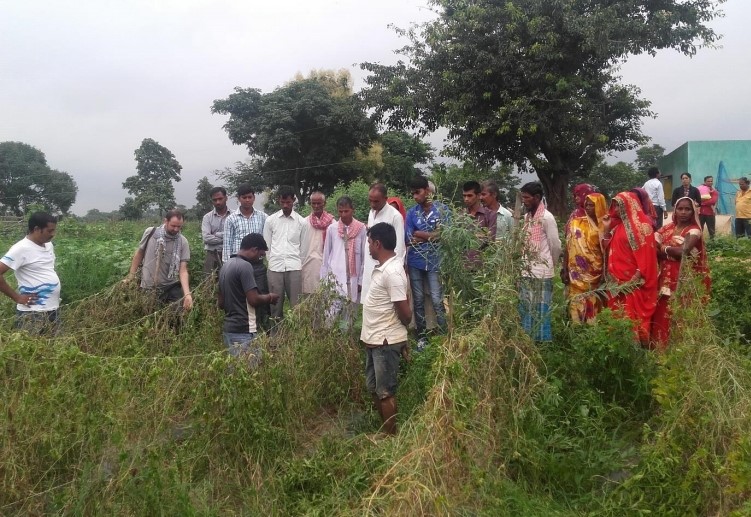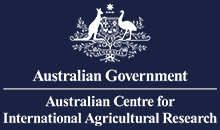By Santosh Mali and Anoj Kumar
A field visit of DSI4MTF project farmers to ICAR-RCER Research Centre Ranchi was undertaken on 13th Aug 2016. Fourteen farmers including 6 women farmers from both the villages, Bhagwatipur and Mauahi, participated in the training program cum-exposure visit. This was one day visit in which farmers were given 3 hours of classroom training on vegetable cultivation practices and plant protection measure. The training was facilitated by scientists and technical persons from ICAR RCER Ranchi through three interactive sessions of one hour each. In Second half of the day, farmers were taken to experimental fields of ICAR where they got an opportunity to acquaint and understand the better techniques of vegetable cultivation including drip, sprinkler, mulching, vermi composting, shade net nursery production etc. After visit to on-station trials the farmers visited the fields of one of the progressive farmers of Devgain village of Ranchi district of Jahrkhand. The farmer is cultivating the vegetable crops with state-of-art technologies of crop production like drip system of irrigation, bicolour polythene mulching, fertigation with ventury and better nutrient management.
Participants
- 14 Farmers (6 women and 8 men)
- Ritesh Kumar (Sakhi)
- Neetu Singh(Sakhi)
- Rajesh Kumar(Sakhi)
- Ritesh Ojha(Field Assistant ICAR)
- Omkar Kumar(Field Assistant ICAR)
- Fraser Sugden(IWMI)
- Santosh Mali(ICAR)
- Anoj Kumar Kumar(IWMI)
Why Selected Ranchi for field visit?
- Many farmers of Ranchi have already adopted drip, plastic mulch and other best agronomical practices for vegetable cultivation. The purpose was to help our project farmers through their experiences.
- The objective was to learn how farmers of Ranchi have overcome the problem of water scarcity during the dry season.
- Farmers exposure to intensive vegetable cultivation practice and use of biological and organic pest and disease control
- Many tribal and other socially backward farmers of Ranchi have adopted improved vegetable cultivation practices which can be a good learning example for our farmers.
In house training on agronomical practices by ICAR Scientist
This session was taken by three scientist from three different discipline one from horticulture division, one from pathology division, and one from entomology division.
- Vijay Kumar Singh, Senior Technical Officer, ICAR RCER Ranchi covered the ground on general practices of vegetable cultivation starting from field selection for vegetable cultivation till harvesting all practices. Selection of crop, selection of seed, use of fertilizer and irrigation practices. Many farmers ask their query to the scientist and get their answer. Vegetable cultivation on large scale was stressed upon through a general economic analysis of tomato cultivation. Also Off-season cultivation of vegetables through low tunnels and staggering the dates of sowing/planting was discussed as a better option to fetch higher price in the markets. The sowing times and improved varieties of different vegetables was also discussed during the interactions with the farmers. This was very useful session to farmers.
- Pathology scientist (Dr Sudarshan Maurya, Senior Scientist, ICAR RCER Ranchi) discussed the general and particular diseases of vegetable in different seasons and their control measures. During this session scientist covered the aspects of selection of disease free seed and planting material, preventive measure for disease appearance and control measure. Seed treatment and management of tomato and Brinjal wilt was discussed. He also showcased the packets and pouches of the effective and commonly available fungicides in the market. During this session farmers asked many questions and got a satisfying reply from the scientist.
- Entomology Scientist (Dr. Jaipal Singh Chaudhary, Scientist, ICAR RCER Ranchi) discussed the insect pest infestation of different vegetable crop grown by our farmers during last summer season and current vegetable crop (Brinjal). He shown the video of life cycle of insect pest and explained the most harmful stages of the insects that needs immediate control. For controlling the damage of crop farmers should know which stage of life cycle of insect pest can be controlled to bring down the pest population below the economic threshold level. He also discussed the biological control of pest in brinjal and Okra crops. In brinjal crop, if farmers grow maize as border crop, then insect pest gets attracted to maize flower and farmers need to apply pesticide on maize flower only. Thus farmer can prevent the potential damage that a pest can cause. He also talked about growing of coriander crop in between brinjal crop can reduce the insect pest infestation and farmers can take additional income from coriander leaf. He also talked about use of pheromone trap for different crop to control insect pest population. Another low cost technique like use of jaggery (Gur) and nuvan to control the insect pest population.
Field training and field visit
Farmers were taken to the experimental fields of ICAR RCER by Mr. Chandrakant Gupta, Senior Technical Officer, ICAR, RCER, Ranchi who demonstrated the drip & Sprinkler irrigation technology, mulching and raising of nursery in portray and different variety/cultivar of vegetable and fruit crop. He also exposed the farmers to a vermicomposting unit. He explained the utility and benefits of these technologies to the farmers and answered the queries raised by the farmers.

Mr Anoj, Dr Frazer and Farmers heading for field visit
Visit to the farms of a progressive farmer
After the detailed discussions on the technologies demonstrated at ICAR-RCER, Dr. Santosh Mali led the farmers to visit the farms of one of the progressive farmers Mr. Shivcharan Kachhap of Devgain village of Ranchi district. This farmer practiced rice-follow system for years with low net returns and had difficulty in sustaining his livelihood. During last 2 years he has started growing multiple crops in year through adoption of drip irrigation system, plastic mulching and intensive farming of vegetable crop. With the experiences he learned from the drip irrigation that he practiced from a small scale drip irrigated plot, he has now increased the area under drip irrigation system to 3.5 acre. This has increased his income by many folds. Inspired by his success, many farmers in the adjoining areas have followed the suit. Mr. Shivcharan Kachhap shared his experiences on how he started the vegetable cultivation practices and use of drip and plastic mulching for water conservation and taking best crop of vegetable. He also showcased a nursery of vegetable crop where he is growing nursery in portray which allows early planting of vegetable crop to fetch the good price of their produce. He also discussed in detail the marketing mechanism of vegetable produce. Mr. Shivcharan Kachhap presently has the standing crop of Chilli, Tomato, Bitter guard (late stage crop), other minor vegetable crop and a healthy nursery of cucumber. Mr. Shivcharan also shared his experiences on cash and kind benefits from different crops he is earning through adoption of improved vegetable cultivation practices. The bitter gourd was cultivated in rows of trellis with a staking support of a bamboo and nylon thread. He explained the farmers about the total cost involved in bitter guard cultivation and net income he earned from the cultivation of one acre of bitter crop on trellis. This was very motivating aspect to our farmers. He also shown the yellow sticky paper for insect control in chilli field. He also demonstrated the farmers the fertigation process through drip irrigation system. Ventury system of fertilizer application was much appreciated by the farmers, particularly the response of women farmers was overwhelming.
Farmers interacting with Mr Shivcharan Kachhap of Devgain Village
Acknowledgements:
It was a great team effort. Mr Ritesh Kumar and Sakhi team making the travel arrangements for the farmers. Mr Anoj Kumar (IWMI) looked after the needs of the farmers during the journey and ensured safe travel during the 16 hrs of 550 km long journey. Dr Santosh Mali (ICAR-RCER, RC Ranchi) arranged all logistics for the stay at Ranchi, organised a training program in his office premises successfully and co-ordinated a visit to farmer’s field. The interactions with Dr Frazer Sugden (IWMI) during the training and field visits were useful in further planning and implementation of the project.






